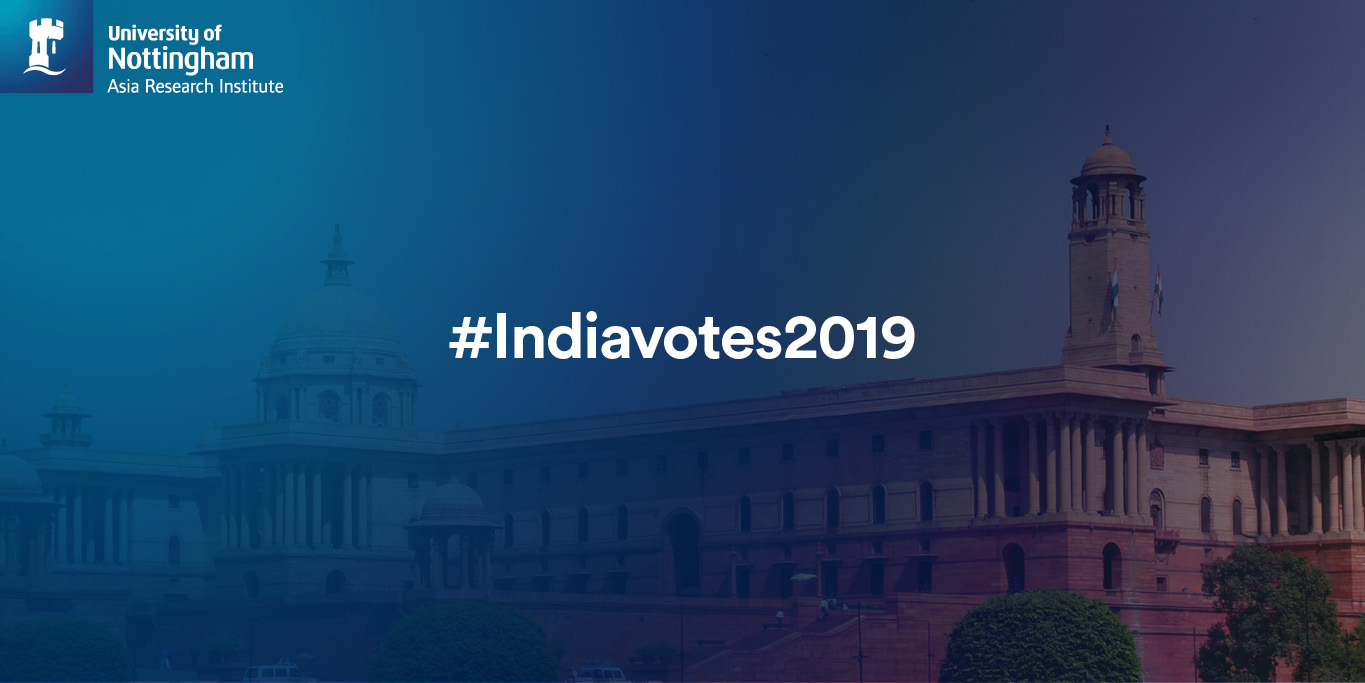Driving commercial and political engagement between Asia, the Middle East and Europe
Driving commercial and political engagement between Asia, the Middle East and Europe
Driving commercial and political engagement between Asia, the Middle East and Europe

Asia House is partnering with the University of Nottingham’s Asia Research Institute to keep you up-to-date on the Indian Elections 2019. Read their analysis on the largest democratic exercise in the world below.
What we know
This week the focus of the polls moved to the northern Hindi heartland, where the Bharatiya Janata Party (BJP) secured 190 of the 225 seats of these states in 2014. Although this is not the first week where constituencies in the Hindi heartland have voted, the focus is now squarely on these states, which include Uttar Pradesh, Bihar, Madhya Pradesh and Rajasthan. In late 2018 the BJP lost the state elections in Rajasthan, Madhya Pradesh and Chhattisgarh. As we discussed last week, the importance of national security in the campaign continued, with Prime Minister Narendra Modi and the BJP making capital out of the Sri Lanka attacks. However, as Tanvi Madan argues in this podcast, it is better understood as an election that has featured a heavy narrative about the importance of national security (from the BJP), rather than an election about how to achieve national security.
More violence was seen between party workers in West Bengal. This is an increasingly important state for the BJP as it seeks to offset any losses in the Hindi heartland. Modi has campaigned heavily in the state. Concerns continue about the Electronic Voting Machines malfunctioning (addressed by us in previous briefings), as well as more complaints regarding the Election Commission’s Model Code of Conduct being violated.
Continuing presidentialism of the campaign continued with Modi being interviewed by Bollywood actor, Akshay Kumar. The interview, which was widely criticised by the opposition parties for being ‘non-political’ (Modi is infamous for his refusal to give press conferences) was released after the Election Commission of India belatedly banned the release of a biopic of Modi. An analysis of Modi’s speeches revealed that he mentioned his own name more than that of the ‘BJP’ or the ‘Congress’. Personal attacks continued, with the BJP questioning whether Rahul Gandhi was really an Indian citizen, reiterating a charge dismissed by the Supreme Court in 2015.
With Rahul Gandhi campaigning in Wayanad last week, attention shifted to the other Gandhi sibling – Priyanka. Speculation had been mounting (encouraged by Congress) that Priyanka would stand against PM Modi in the constituency of Varanasi in Uttar Pradesh. This week it was confirmed that she would not do so, disappointing many and portraying the Congress as indecisive.
What we think
Opposition disunity continued with a major spat between a prominent regional party, the BSP, and Congress. The tensions between these parties raise doubts that should the National Democratic Alliance (of which the BJP is the leading member) not win a majority, any alternative government could be formed. Although Gilles Verniers argues that ‘the Hindi belt races are more open than what one would have expected until quite recently and that the Congress could upset the BJP plans if it can get its act together’, there is little sign of the Congress getting its act together. As discussed last week, one example of this was the failure of the Congress and Aam Aadmi Party (AAP) to strike a pre-electoral alliance. Many commentators have put the blame on Congress for failing to secure one. Even Congress allies are questioning whether Rahul Gandhi would be the top contender for Prime Minister if the Congress became the largest party and Congress continues to fail to project its vision for India.
Turnout in the only constituency in Jammu and Kashmir that conducted polls in the 4th phase was low, less than 10 per cent, reflecting the separatist’s call for a boycott. The state has been alienated by the Modi government; by its use of pellet guns against protestors in the state, as well as the dissolution of the state government in October 2018. Elections for the new state assembly have not yet been scheduled (there were calls for elections to be held at the same time as the national elections) and the issue of removing Kashmir’s special status in the Indian constitution continues to be a prominent election slogan for the BJP.
Things to watch out for next week
Rahul Gandhi is up against Union Minister Smriti Irani in the Congress stronghold of Amethi in Uttar Pradesh (the second seat he is standing for in this election). The BJP’s controversial Chief Minister of Uttar Pradesh, banned from campaigning for three days earlier in the campaign for making anti Muslim comments, has been campaigning for Smriti Irani this week. Voters deliver their verdict in this constituency on 6 May but we will have to wait for the results until the 23 May.
The nomination of Sadhvi Pragya Thakur as the BJP’s candidate in Bhopal (against veteran Congressman Digvijay Singh) continues to generate headlines. This week, even the BJP’s Chief Minister of Maharashtra urged her to be ‘careful’ in her language and criticised her comments cursing a police officer who arrested her for her involvement in a bombing in 2008. The police officer, Hamant Kharkare, later died. This demonstrates the worries that certain members of the BJP have that her candidacy will alienate voters in other parts of India. Bhopal goes to the polls on 12 May.
The University of Nottingham Asia Research Institute is a community of world-leading research comprised of 200 Asia experts across the University’s three campuses (UK, China and Malaysia). View: Blog| Asia Expertise| India Expertise
*This article has been modified in line with Asia House editorial guidelines.
